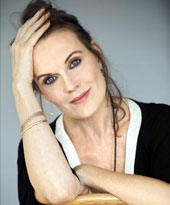Why do I want a workshop?
There are already too many writing courses!
But what I can see is a lot of people about how it should be written. One should fix the models, The templates, the dramaturgical curves right. HU!!!!
One can be a fan of pushing your bad idea correctly into a correct dramaturgical curve, one can get with all the right elements to meet the templates, But it is not to create. Sorry, It does not make a story. It makes one not even very happy.
These templates and curves and theories can be aids if you have been stuck – Great – But this is not where the creation begins.
I myself have never taken a single writing course. Tvärtom, I have been shooting them. Especially at the beginning of my career I ran a long way to H-E if a course tried to approach. Trip was that. If I had taken writing courses, I would most likely have tried to do as a man ” should ” and maybe even tried to mimic someone else who was considered right, or as I thought seemed better than me. I had become insecure and doubted my own ability. I would probably have stopped listening to what is coming to me, and instead focused more on the curves, The templates, the shapes and to try to puzzle everything together, search in my imagination very conscious for what would be needed according to form and not by what might have been brilliant but unexpected – and therefore limited, halted and distorted my own imagination.
And the result of that had not touched people's hearts and senses that my works have managed to make – Through decades now and not just in Sweden, not only the dramatic works but also the novels. I have not taken into account what anyone could think of them. I am absolutely sure that all the fairy tales and fables and myths and very good literature and drama through the ages have not actually become other than just like that. This does not happen by putting the tools correct.
Sure I have bothered about what others are going to like them! There is always a recipient. But during the creation of the stories I have only listened to the stories and that is there the stories have the power to touch – they are not prepared, they have only got to.
If one lets things happen, so very much happens!
Men!
To go to a workshop, to have the itchy desire to write, should not be about writing professionally, Without writing out of itself, one's desire and not to judge oneself or torment with ” how it should be” – write because it is fun and because you feel good about it. People do not go and learn to paint watercolor to become professional artists and have exhibitions or go on dance courses or learn to play guitar to become a professional? No one does it because all this is expression of being living curious man. Sadly, printer courses are often weighed by some kind of promises that the participants will become professional and already there you end up in the anxiety, Because in that case one must write commercially viable, that is, according to a pretended success template, tuning! Where is the fun then, Lust, the liberation, glädjen, What makes a happier and stronger and calmer?
So my workshop is not about rules and templates. It is about arousing, charge, discover the flowing creativity we have all the time. It is obvious, maybe you don't need so much help with, one might think, But I don't think so! I think it's very good to tease it, wake it, rediscover it and to actually spend a few hours to it on a Saturday. We usually have fun. It will be a mixture of joint exercises and individual and when the pens scratch against the papers I usually find it difficult to get the participants to stop!
Many people have an itchy writing desire and here you get the start -up energy plus you will get open doors you didn't know they even existed. You don't need any experience at all.
The workshop is posted on once or twice. If you choose twice then the second time is the depression, but you can go only once in case you want, It goes a long way.
We start at ten o'clock, have lunch between twelve and one and then an afternoon session until at the earliest three, Last four. You will go from there with a small story that you did not know it existed, As you went there. Ja, Several actually.
None of you should feel that you have to perform, It's not about it, and we will not sit and value something that someone else has done. You will have to practice trusting your own imagination and creativity. I'm pretty sure you will have fun.
There will be both individual and joint exercises!
Day 2, The week after, will contain creative warm -up followed by more concrete writing exercises, with continued challenges / Games for the imagination. If we can, I will also go into some tricks.
If you instead have a script that you want feedback on, Do I take myself on time for such work as well. Then they are not play, Without severe seriousness. Contact me if interested.
We will hold on to the middle of Stockholm i a local at Torsgatan.
The course date is it 25 januari ( Saturday ) And it 1 Ficeuari ( Saturday)
I rear myself after Christmas so the price for an occasion is 1490 crowns and for both 2.850.
Sign up for this email address : yrlay@icloud.com
We shall not be too many, So first, first served!
Warm welcome!


